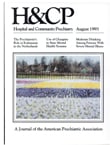Treatment by a Psychotherapist and a Psychopharmacologist: Transference and Countertransference Issues
Abstract
Recent surveys suggest that collaborations between psychiatrists acting as medication consultants and therapists providing psychotherapy are an increasingly common form of treatment. Complex transference and countertransference reactions can arise in these "therapeutic triangles". Risks include splitting by the patient, conflicts between the two practitioners, and premature termination of either the psychotherapy or pharmacotherapy. The authors discuss typical transference and countertransference reactions that can lead to these problems and present case examples of productive and unproductive collaborative efforts. The authors describe a collaborative approach based on mutual respect, trust, and openness that, along with an awareness of typical transference and countertransference issues, can increase the likelihood of a positive treatment outcome.
Access content
To read the fulltext, please use one of the options below to sign in or purchase access.- Personal login
- Institutional Login
- Sign in via OpenAthens
- Register for access
-
Please login/register if you wish to pair your device and check access availability.
Not a subscriber?
PsychiatryOnline subscription options offer access to the DSM-5 library, books, journals, CME, and patient resources. This all-in-one virtual library provides psychiatrists and mental health professionals with key resources for diagnosis, treatment, research, and professional development.
Need more help? PsychiatryOnline Customer Service may be reached by emailing [email protected] or by calling 800-368-5777 (in the U.S.) or 703-907-7322 (outside the U.S.).



